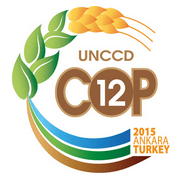 12 October 2015: In their opening statements at the twelfth session of the Conference of the Parties (COP 12) to the UN Convention to Combat Desertification (UNCCD), many delegates welcomed the recognition of the importance of land restoration in the Sustainable Development Goals (SDGs) through a specific target on land degradation neutrality (LDN).
12 October 2015: In their opening statements at the twelfth session of the Conference of the Parties (COP 12) to the UN Convention to Combat Desertification (UNCCD), many delegates welcomed the recognition of the importance of land restoration in the Sustainable Development Goals (SDGs) through a specific target on land degradation neutrality (LDN).
COP 12 opened in Ankara, Turkey, on Monday, 12 October. In recognition of a three-day period of mourning for victims of the recent bomb attacks in Ankara, delegates observed a moment of silence to express their solidarity.
During the opening plenary, the new COP 12 President, Veysel Eroğlu, Minister of Forestry and Water Affairs of Turkey, expressed his country’s commitment to share its expertise in combating desertification, land degradation and drought (DLDD) through afforestation measures, and announced the forthcoming launch of the Ankara Initiative, a multicultural platform for actions to combat DLDD. He said Turkey will provide an initial financial contribution of US$5 million as well as capacity building support, particularly for African countries.
At a press conference focusing on key expectations for the session, UNCCD Executive Secretary Monique Barbut emphasized the strong interlinkages among DLDD, food insecurity, migration, conflict and political instability, and noted that one of the main measures of success at COP 12 will be the adoption of voluntary national targets on LDN. She added that a focus on land rehabilitation could enable countries to restore up to 12 million hectares of degraded land a year, and help close half of the remaining emissions gap, “enabling us to keep within a two degree temperature rise.”
Addressing the plenary, Nicolas Hulot, Special Advisor to the President of France, stated that success at the Paris Climate Change Conference needs to recognize that: living in harmony with nature is a strength; desertification and climate change are linked; and an economic model based on cooperation, justice and fair trade must be developed. Stressing that “without the soil, no future is possible,” Hulot urged parties to be aware that at both UNCCD COP 12 and UNFCCC COP 21 will effectively decide “who will live and who will die.”
In addition to hearing opening statements by parties, UN agencies and civil society, the opening plenary adopted the COP 12 agenda and organization of work, elected COP 12 Vice Presidents representing the five regional groups, and established a Committee of the Whole (COW) to consider, among other agenda items: implications for the UNCCD of the post-2015 development agenda; effective implementation of the Convention; programme and budget; and the mandate and scope of the Convention. Delegates also adopted the document on accreditation of intergovernmental and non-governmental organizations and admissions of observers.
Noting that recent reforms at the UNCCD Secretariat and the Global Mechanism of the UNCCD have introduced administrative reforms and cut operational costs, Barbut informed parties that the Secretariat will achieve “zero nominal growth” of the core budget for the next biennium.
On Tuesday, delegations embarked on a substantive review of COP 12 documents, convening the first meeting of the COW in the morning, and the first working sessions of the Convention’s two subsidiary bodies – the Committee on Science and Technology (CST) and the Committee for the Review of the Convention (CRIC) – in the afternoon. [UNCCD News Announcement, Monday 12 October] [UNCCD News Announcement, Tuesday 13 October] [IISD RS coverage of UNCCD COP 12] [IISD RS sources] [UNCCD webpage] [Government of Turkey COP 12 webpage]